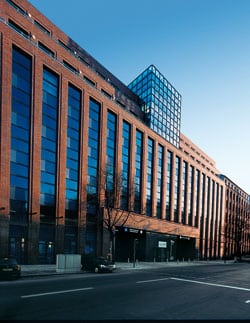Q&A with ORCO
 Berlin is experiencing a rebirth similar to the one London went through in the late 1990s. It’s becoming a place where people want to live, tourists want to visit, and where commerce wants to do business. With occupancy rates at their peak, Sebastian Blecke, COO of ORCO, GSG Berlin’s biggest office and commercial space provider explains where it all went right…
Berlin is experiencing a rebirth similar to the one London went through in the late 1990s. It’s becoming a place where people want to live, tourists want to visit, and where commerce wants to do business. With occupancy rates at their peak, Sebastian Blecke, COO of ORCO, GSG Berlin’s biggest office and commercial space provider explains where it all went right…
A Recent report from PwC singles Berlin out as one of Europe’s top five cities for growth. What changes have you noticed in Berlin’s property in the last two years – and do you see it continuing.
In Berlin, we see a lot of movement. Presumably, there’s no other city in Europe experiencing so many changes as Berlin. Where else do you have the situation that two separate cities (former East and West Berlin) grow together to one city again, where huge project developments are and have been realised within the very heart of the city, where urban airports are closed and turned into leisure and recreation facilities, new train stations and airports are built, etc. Of course, this has had an effect on the commercial and residential real estate market. Meanwhile, Berlin is perceived as a genuine metropolis and as “hip”. The population is growing continuously and there is a sharp increase of single households. That led to a substantial rise in rents – especially in central locations. Many companies as well are drawn to Berlin, thus, showing stable growth in this sector, too. A lot of international companies deliberately choose a location in Berlin.
Both real estate markets, however, show that investors believe in the city’s potential – and they’re right!
 Which is the stronger sector at the moment – residential property or commercial, and what factors do you see driving growth in the market?
Which is the stronger sector at the moment – residential property or commercial, and what factors do you see driving growth in the market?
At the moment, the residential sector is to be considered the stronger sector, estimations say that a minimum of 30,000 flats are missing in Berlin, having of course an impact on prices and leading to a further rise in rents, as demand cannot be covered within a short period of time. In Germany-wide comparison or comparison with other European cities and capitals, Berlin still is clearly below the average rents there. But the commercial real estate market is developing well, too. It’s becoming more and more difficult to get a continuous area of >3,000 m2 in an inner city location. The many departures at the Potsdamer Platz, however, and the vacancies associated with this will relieve the situation to some extent. Though not everybody will be able and willing to pay the rents called for there, so that the secondary locations in Berlin are up-and-coming as well.
Furthermore, Berlin will grow stronger in the sector of small and medium-sized businesses. The market will be able to take advantage of the growing sectors such as health technology and IT (already today Berlin is considered “Europe’s Silicon Valley”).
Berlin’s real estate market has been largely stagnant for decades – has the new mood taken anyone by surprise?
It’s not really been a surprise. As expected, the penny has finally dropped. Actually, this process is not that new, obviously it is now only more noticed, too. Berlin’s mayor, Klaus Wowereit (SPD), said a few years ago “Berlin is poor, but sexy.” Meanwhile, we can see one record result after the other in terms of hotel stays, we have established fairs such as Bread & Butter, Fashionweek, IFA, etc. in Berlin as constants and more and more service companies with respective workplaces in Berlin. At the same time, however, workplaces in traditional industries are playing an insignificant role. But we are experiencing a very strong development in “new” industries from the field of future technologies and creative economy. This changed industrial landscape is especially marked by small and medium-sized businesses. Thus, the ORCO-GSG offers an attractive home for those companies in combination with various services on site. Not only a few tenants within the ORCO-GSG portfolio are global leaders in their niche and are virtually considered as “hidden champions”. High-qualified engineers are researching and developing products in our industrial complexes, which will later be found all over the world.
 A lack of jobs and money in the local economy has long been blamed for keeping property prices low (compared with cities like Munich and Frankfurt). How has Berlin changed?
A lack of jobs and money in the local economy has long been blamed for keeping property prices low (compared with cities like Munich and Frankfurt). How has Berlin changed?
We should look at this question in a differentiated way: For the residential real estate market it is true that Berlin, being one of Germany’s poorest federal states with a high unemployment rate, surely cannot keep up with the rents and real estate prices in Munich or Hamburg. Here, however, other reasons play a role also and for sure we could discuss this question for quite a while.
At the commercial real estate market we can see a different development. Meanwhile, Berlin ranges in the same rental price areas as other cities in Germany. And this has to be like that, as, in particular for large businesses, a harmonization of rental prices is perceivable all over Germany.
Both real estate markets, however, show that investors believe in the city’s potential – and they’re right! We’ve been noticing that for years through (rental) prices tending to increase and falling yields.
Berlin hit the international headlines last year with evictions from squats that had been occupied since re-unification. Are developers facing animosity, or are the changes being welcomed?
Times, in which the autonomous scene of Berlin occupied several houses over years, are gone. Altogether, this development has also provided more security for Delevopers and the “laissez-faire” attitude of the public authorities regarding occupied houses from the 1980s doesn’t exist any more. All in all, it should be clearly said that it is a common challenge for the state of Berlin and property owners and –developers, to satisfy the demand of the residential market. Here, it may not be developed without considering the market trends. The ORCO GSG will closely examine, how we can contribute to the further positive development of Berlin, as well with regard to commercial areas and also, perspectively, to residential areas.


